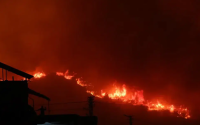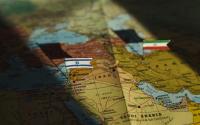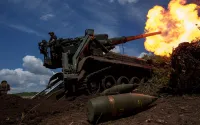Daily Telegraph, 5 December, 2001At 14, Parwiz must be one of the world's youngest arms dealers. On a dusty street in the Ashiqan-Arifan quarter of Kabul he sells pencil-thin cords of high-explosives at 10p a go.The caramel-coloured strips come from the propellant of a rocket-propelled grenade. Parwiz looted them from a bombed-out Taliban base last week, stripping down the weapons himself."They are really great at night," he said in slick salesman's patter to a crowd of potential buyers, children dressed in rags. "You light the end and they glow and fizz beautifully."In his hands Parwiz held enough explosive to kill them all. He pulled one of the strips from the bundle and held it temptingly in front of the children's faces. This time there were no takers but Parwiz, a small boy with cold sores on his lip and stained teeth, said business was good. He said he was making enough money to give up his old job of cooking green beans and selling them in the market. In a week he grosses around 50,000 Afghanis, about £1, and hopes to use the money to buy new clothes for Eid, the holiday marking the end of Ramadan. "My father is a cook and my mother is at home," he said. "They are poor and cannot buy clothes for me."Parwiz's merchandise is unusual but his entrepreneurial spirit is born of a need shared by many of the capital's children. In a country that rates among the world's poorest, locals estimate half of Kabul's young never see a classroom. In the street bazaars and sweatshops it is common to find children as young as eight doing a man's job. In one of the better parts of town, Mohammed Kasim, 10, was busy with his tools. He is a refrigerator mechanic and counts himself lucky to have such a good job. He said: "My work is good. I come in at eight and leave at four. For that I receive 20,000 Afghanis [40p] a week." These children, who work long hours for tiny wages, may seem unlucky, but they are the envy of their unemployed peers. Half an hour from Kabul, along cratered roads on the edge of the Shomali plain, lies Quasaba Kargari. The name means Workers' Town. Constructed by the Soviets in the 1980s to service a nearby factory that produced prefabricated, five-storey buildings, it has long since run to seed. When foreigners arrive, hordes of children gather around. "We are all jobless here," said Salahuddin, 14. "I would like to get a job knitting rugs but cannot find an employer." Another small boy begged: "Can't you get our factory running again? We need work, we are hungry and we have received no help."The result of 25 years of war and a ravaged economy is a generation of children old before their time. Lacking education and parental control, many are ignorant or even brutal. More young boys know how to use a Kalashnikov than can read and write. When we arrived dozens, then hundreds of children swarmed around, cheering and waving. But soon their joy turned to boredom and then spite. They began to throw stones at us and the crowd of children metamorphosed into a seething mob. They hammered on the windows with small fists and kicked the side panels. Their faces were convulsed with hatred and bloodlust.
Boy, 14, Finds Work Selling High-Explosives
Canlı Yayın
Açık Gazete'nin yıl boyunca sunduğu haberlerden öne çıkan derlemeler
Kâinatın tüm seslerine, renklerine, titreşimlerine Açık Radyo...
İletişim
Açık Medya Yayıncılık A.Ş.
Koltukçular Çıkmazı No 7 İç Kapı No 2
Tophane, Beyoğlu, İstanbul, TR-34425
Telefon: +90 212 343 4040
Faks: +90 212 232 3219
E-posta: [email protected]






